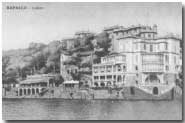Encyclopedia - The Rapallo Conference
 The Rapallo Conference of
5-7 November 1917 saw Allied political and military leaders agree upon the
formation of a
Supreme War Council intended to co-ordinate military action across each
of the Allied armies.
The Rapallo Conference of
5-7 November 1917 saw Allied political and military leaders agree upon the
formation of a
Supreme War Council intended to co-ordinate military action across each
of the Allied armies.
The conference was called and held in the wake of a severe Italian setback at Caporetto in October 1917, a major Austro-German success on the Isonzo.
In attendance at the conference - which was held at the New Kursaal Hotel in the small town of Rapallo - was (for Britain) David Lloyd George, the Prime Minister, William Robertson, the Chief of the Imperial General Staff; Lieutenant-General Henry Wilson and (from South Africa) General Jan Smuts.
Representing France was Paul Painleve, the Prime Minister; Henri-Philippe Petain, the Commander-in-Chief; General Ferdinand Foch; Generals Maxime Weygand and Dedondrecourt; H. Franklin-Bouillon (a Minister without Portfolio); and the Ambassador to Rome Barrere.
The Italian delegation was led by Vittorio Orlando, the Prime Minister, who was accompanied by Sidney Sonnino, the Minister of Foreign Affairs; General Alfieri, the Minister of War; and General Porro, the Deputy Chief of the General Staff.
Aside from promising fresh aid to the Italians Lloyd George was keen to reign in the scope for independent action of both Robertson and the Commander-in-Chief Sir Douglas Haig. He envisaged that the creation of a Supreme War Council to oversee military activity would satisfy his aim.
The Allies rapidly agreed upon the establishment of the council which was to be based at Versailles. Its initial members were to be Wilson (for Britain), Weygand (for France), Luigi Cadorna (for Italy), and Tasker Bliss (for the U.S.A.).
On the final day of the conference, 7 November, Cadorna - the Italian Chief of Staff - was dismissed for suggesting that Italy's disastrous performance at Caporetto may force the country to sue for peace. Arriving at the conference Robertson, Foch and Wilson were consequently of the view that the 'defeatist' Cadorna needed to be replaced; ultimately Orlando concurred.
A "red cap" was a British military policeman.
- Did you know?
